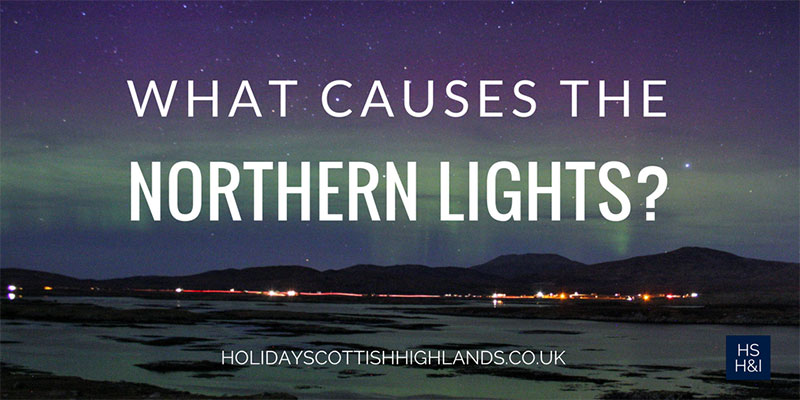
We are a little bit obssessed with the Northern Lights or aurora borealis, in case you haven’t noticed. In Can you see the Northern Lights in Scotland?, we shared our tips for increasing your chances of seeing the aurora and in this post about the Northern Lights in Scotland we answer questions such as what causes the northern lights and what do they look like?
Storms on the sun send a solar wind (a stream of charged particles escaping the Sun) across space. If Earth is in the path of the particle stream, the Earth’s magnetic field is distorted by the solar wind. The interaction of this solar wind with the Earth’s magnetic field and atmosphere causes the Northern Lights as the charged particles strike atoms and molecules in the Earth’s atmosphere, this excites those atoms, causing them to light up.
The process is similar to how neon lights work (eg. on business signs.) Electricity is used to excite the atoms in the neon gas within the glass tubes of a neon sign which then produces the vibrant colours.
The aurora can appear in many different forms and some are more impressive than others. You need to look out for patches or scattered clouds of light, sweeping arcs, rippling ribbons or shooting rays that light up the night sky with an ethereal glow. Sometimes is takes a while for you to be sure that you are actually looking at the Northern Lights.
The Northern Lights are normally green and pink but aurora watchers have also reported shades of red, yellow, blue, and purple. Sometimes the colours can be quite subtle.
The Northern Lights are also known as the aurora borealis. Aurora means “sunrise” in Latin and is also the name of the Roman Goddess of the dawn, Borealis is the Greek name for the north wind. In the southern hemisphere they are known as aurora australis.
In Scottish Gaelic folklore the Northern Lights are known as the Na Fir Chlis which in English is “the Nimble Men” and in Shetland the Northern Lights are called the “mirrie dancers”. In Scotland, the Northern Lights were described as battles amongst sky warriors or fallen angels. People believed that blood from the wounded fell to earth and spotted the “bloodstones” or heliotrope found in the Hebrides.
In Norse mythology, the aurora was considered to be a bridge of fire leading to the sky built by the gods. Some Inuit people believed they could see the spirits of their ancestors dancing in the aurora.
If you found this post useful and think your friends would like it, please share it with them using the sharing buttons on this page. Thanks for spreading the word.
No results available
Holiday Scottish Highlands & Islands
© 2025 — All rights reserved